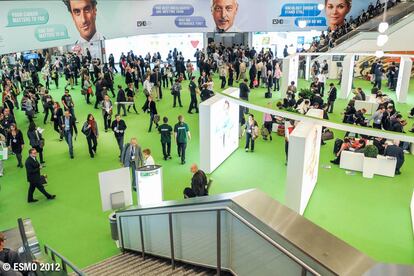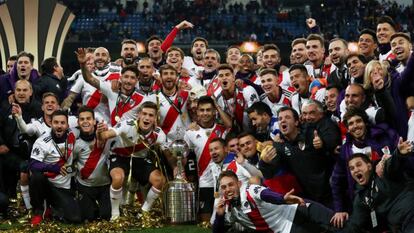Why a medical convention could be more profitable for Madrid than the Champions League final
The annual congress of the European Society for Medical Oncology is expected to bring 200,000 overnight stays and generate around €65 million


It may lack color and fanfare, but a medical convention due to take place in Madrid in 2020 will bring more cash to the capital than the Champions League final on June 1 of this year, according to calculations made by city officials.
The annual congress of the European Society for Medical Oncology (ESMO), scheduled for September of next year at the IFEMA convention center, will attract 25,000 professionals and generate around €65 million, according to Madrid Destino, a municipal company that handles tourism, venues and events. In contrast, the final of the UEFA Champions League between Liverpool and Tottenham at the Wanda Metropolitano stadium will generate €56 million.
The fact that medical congresses are something of a cash cow is easily overlooked
These forecasts can vary depending on the applied methodology, but the data indicates that medical conventions are highly profitable events, which explains why cities around the world are so keen to host them. According to the International Congress and Convention Association (ICCA), Madrid has shot from seventh to third place on the list of top world cities for international association meetings, of which there were 165 in the Spanish capital in 2018.
To calculate the impact that the ESMO convention will have on the city’s coffers, Madrid Destino looked at the sums generated by the event in 2014 and 2017, when it was also held in Madrid. In the case of the Champions League final, calculations were based on the direct economic impact of the last 10 finals in the host cities, which ranged from €25 to €52 million.
The fact that medical congresses are something of a cash cow is easily overlooked. Business tourists generally stay in hotels around the IFEMA venue; and when they venture into the city center it is impossible to tell them apart from the average tourist: unlike soccer fans, they do not wear identifying t-shirts. But the fact remains that the high-income bracket of congress participants, coupled with the length of these events, make them a remarkably lucrative proposition.

“The Champions is a great event that boosts the city’s visibility, but even though medical congresses are lower key, they have a tremendous direct economic impact,” says Miguel Sanz, director of tourism for Madrid Destino.
Madrid welcomes more than a million visitors on all kinds of business trips every year, accounting for 11% of the city’s overall tourism and generating more than €1.1 billion.
The ESMO conference will attract doctors, entrepreneurs, activists and journalists interested in the latest developments in cancer treatment, and according to Madrid Destino, this will amount to 200,000 overnight stays over the course of five nights. On top of the predicted €65 million that these visitors will generate, simultaneous conventions organized by associations and laboratories to run parallel to the main event will also bring in their share of financial gain.
Fun for the masses
The advantage of the Champions League final is its branding potential for the city. As an annual sporting event, it attracts more TV spectators than any other and is seen by almost 400 million people in more than 200 countries, according to UEFA. This means free promotion for the city with the possibility of spectators subsequently coming to Madrid as tourists.
A soccer field in Plaza Mayor
Madrid has a soccer fiesta planned for its city center for the final of the UEFA Champion's League: a pitch will be set up in Plaza Mayor and a concert held in Puerta del Sol. Hotels and online lodging bookings will enjoy a bonanza, with the price of Airbnb accommodation for the weekend averaging €707 a night.
But one of the downsides of hosting major sports events is the high cost of security and cleaning services. The Libertadores final in December cost Madrid €650,000 on National Police security alone.
But hosting sporting events is not always considered a positive move. In Stockholm, for example, the current government dropped its bid to host the 2026 Winter Games in order to focus on what they termed “greater challenges”.
In Spain, the Valencia region for years hosted mega sporting events such as Formula 1 races and the America’s Cup, but it is now focusing on smaller yet still profitable events such as marathons. “Sporting events have been for a long time a way of keeping the masses happy,” says sport economics consultant Juanma Murua
While this may be true, business events have been shown to have positive spin-offs too, such as the scientific knowledge that the researchers share when visiting a city, according to director of the Madrid Convention Bureau, David Noack. “We are going to work harder on identifying the positive impact of congresses beyond the purely economic angle,” he says. “It is important for these events to leave a positive footprint in the host city; a legacy.”
English version by Heather Galloway.
Tu suscripción se está usando en otro dispositivo
¿Quieres añadir otro usuario a tu suscripción?
Si continúas leyendo en este dispositivo, no se podrá leer en el otro.
FlechaTu suscripción se está usando en otro dispositivo y solo puedes acceder a EL PAÍS desde un dispositivo a la vez.
Si quieres compartir tu cuenta, cambia tu suscripción a la modalidad Premium, así podrás añadir otro usuario. Cada uno accederá con su propia cuenta de email, lo que os permitirá personalizar vuestra experiencia en EL PAÍS.
¿Tienes una suscripción de empresa? Accede aquí para contratar más cuentas.
En el caso de no saber quién está usando tu cuenta, te recomendamos cambiar tu contraseña aquí.
Si decides continuar compartiendo tu cuenta, este mensaje se mostrará en tu dispositivo y en el de la otra persona que está usando tu cuenta de forma indefinida, afectando a tu experiencia de lectura. Puedes consultar aquí los términos y condiciones de la suscripción digital.








































